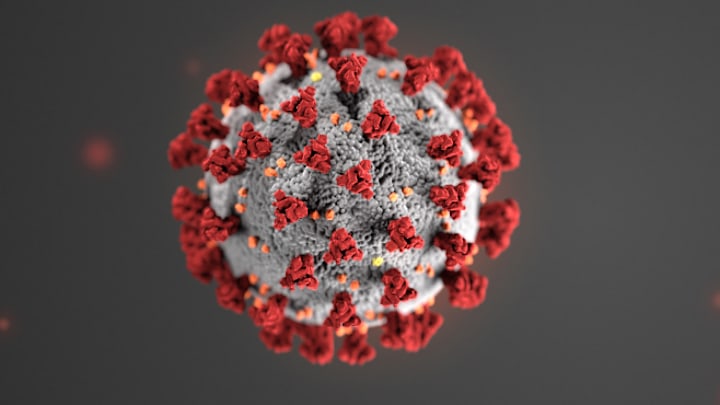Coronavirus on Rise in States Where College Football Thrives, Crimson Tide Scheduled to Play

From recruiting to the biggest bowls, the sunbelt has long been considered the heart of college football, especially since the Southeastern Conference took over as the game's premier league.
But the sun belt, considered the region stretching from the southwest to the southeast is now where the coronavirus is dramatically on the rise. Even Health and Human Services Secretary Alex Azar warned Sunday that the "window is closing" for the United States to get the coronavirus pandemic under control.
Many of the most-affected states are ones in which Alabama is scheduled play this season. In order, the Crimson Tide is supposed to visit Texas, Mississippi, Arkansas, Tennessee and Louisiana.
Georgia can potentially come into play with the SEC Championship followed by either a bowl game or the College Football Playoff. The host locations are in California and Louisiana for the semifinals and Florida for the title game.
In Texas, where Alabama is slated to open the season against USC in Arlington on Sept. 5, Tuesday marked the highest single-day increase in COVID-19 cases for the state.
The Houston Chronicle reported a one-day increase of 7,726 cases, to a total of 164,724 statewide. The statewide total has more than doubled since the end of May, and the rolling average for new cases is now at 5,866.9 cases.
Louisiana reported its highest single-day increase in nearly three months on Wednesday.
California has ordered bars, movie theaters and indoor areas in restaurants closed throughout the state. Gov. Gavin Newsom reported a one-day rise of nearly 5,900 new cases and 110 more deaths.
Florida is closing beaches in South Florida ahead of the holiday weekend. On June 26 it set a new one-day record for infections, and the percentage of new test results coming back positive has also increased, indicating that the rise is not just due to more testing.
Because each state is handling the pandemic differently, and local laws will be in place for each school and potential game, it's impossible for college football to expect any sort of uniformity, either at the conference or national level.
Workouts were the first of many hurdles to be cleared and we're still more than a month away from fall camps opening. There's still no good gauge for what's possible, both for football and schools as a whole, although other pro leagues are about to try and restart.
The University of Alabama has already announced that every student enrolled this fall will need to be tested for the coronavirus before returning to campus, but Tuscaloosa is already having issues with it spreading among students.
Tuscaloosa Fire Chief Randy Smith told reporters on Tuesday that city officials had followed up on a rumor that students who knew they were COVID-19 positive had been attending parties. They were able to confirm them through local doctors and the state health department
The City Council subsequently passed mandatory a mask ordinance beginning Monday. Tuscaloosa County has gone from just over 200 confirmed coronavirus cases on May 1 to 2,000-plus on July 1.
College vs. Pro Standards
As sports seek to return amidst a pandemic, should there be a different standard when it comes to college programs?
In the video above, Sports Illustrated host Robin Lundberg talked with Chaunte'l Powell of Gamecock Digest and Glen West of LSU Country about how programs are proceeding and asked whether the standard for college sports to be played should be different than those for their professional counterparts.
"The answer to this question clearly begins with the absence of compensation for collegiate athletes, but to me, it's much more of a conversation about the difference in the protection of the athletes between college and professional sports," chimed in Brooks Austin of DawgsDaily said. "At least at the professional level, there's at least enough funding to test, trace, and treat each individual case along with providing an equal level of protection for all of the athletes involved.
"On the collegiate level, however, every program has a different method of taking precautionary measures along with a different level of funding."
Two other SI team reporters weighed in on the subject:
Ahmed Ghafir, AllTerrapins: "There’s a distinct difference to me. Professional athletes have a contractual agreement to play the sport and in return, they’re largely compensated with a pair of commas for their annual salary. There is a stronger sense of individual responsibility in pro sports to act as responsible adults. College … not so much. The responsibility ultimately sits with the university when it comes to student-athletes. The difference between reopening college versus professional sports stems from the decision for colleges as a whole to reopen this fall. University officials are partnering with state government authorities as they determine their respective plans to reopen schools, but the fate of college sports lies in the ultimate decision to approve reopening each school. In no circumstance can I see college sports continuing if all students don’t return to campus — otherwise, doesn’t that defy the definition of a student-athlete? Professional teams also have the ability to reopen or close their respective facilities if they choose, just as the Denver Nuggets did on Tuesday, whereas college teams can’t just close their facilities with a campus full of students. There’s more risk to reopening college than professional sports."
John Hoover, AllSooners: "College and professional sports should have different standards for returning to play from the pandemic. The most fundamental basis for this is that student-athletes are part of a far larger campus community and cannot be sequestered to the extent a professional sports franchise can sequester its players. As part of the everyday campus community, and as athletes who also have classroom responsibilities, their exposure will be far greater. Also, the athletes everyone thinks of in college — football and basketball players — frequently socialize with athletes from other sports. College sports is just too large, too broad to hold to the same standards as professional sports."
Did you notice?
• U.S. Sen. Marsha Blackburn expressed "concern," over the NBA's relationship with China.
• Why did the Patriots decide to sign Cam Newton? A look back at the 2011 lockout could provide the answer.
• The NBA's positive COVID-19 cases continues to rise after three Pelicans tested positive.
• In 2000, the New York Mets agreed to buy out the remaining $5.9 million on Bobby Bonilla's contract. Instead of a lump sum, Bonilla agreed to an annual payment of nearly $1.2 million for 25 years including a negotiated 8 percent interest.
Happy Bobby Bonilla Day to those who observe. pic.twitter.com/diGNNqmaoS
— Uncle Jeff (@ebsoftball) July 1, 2020
